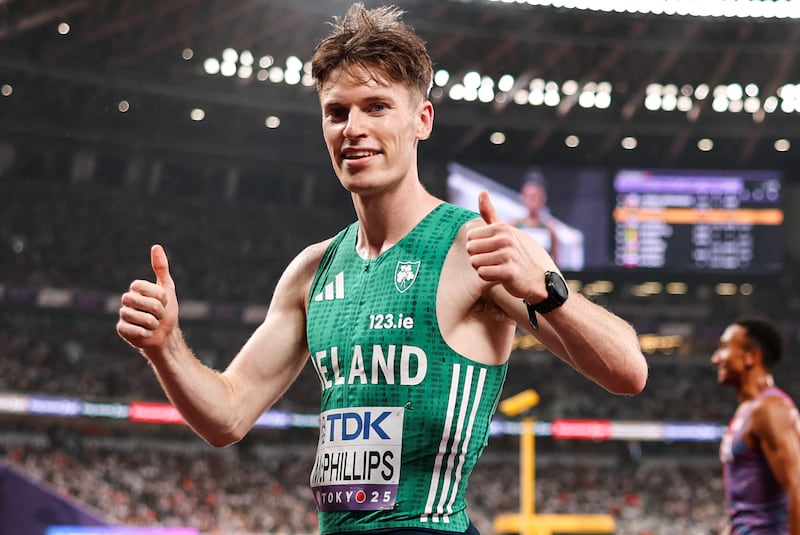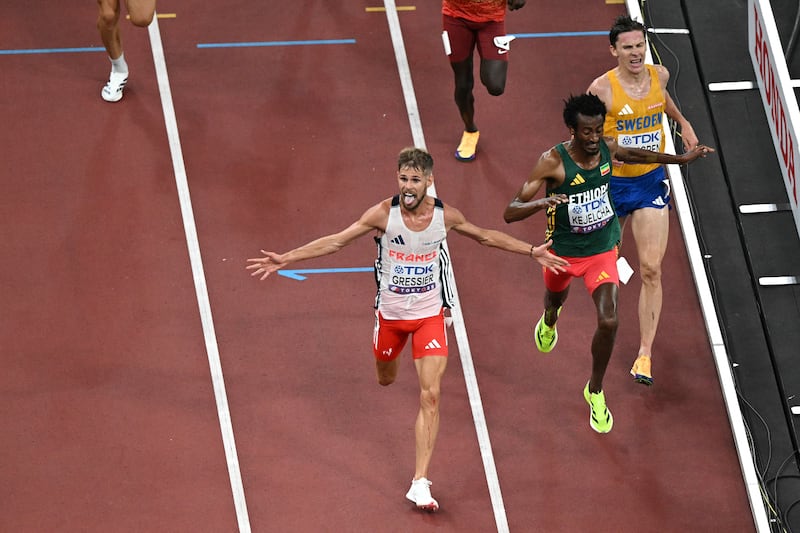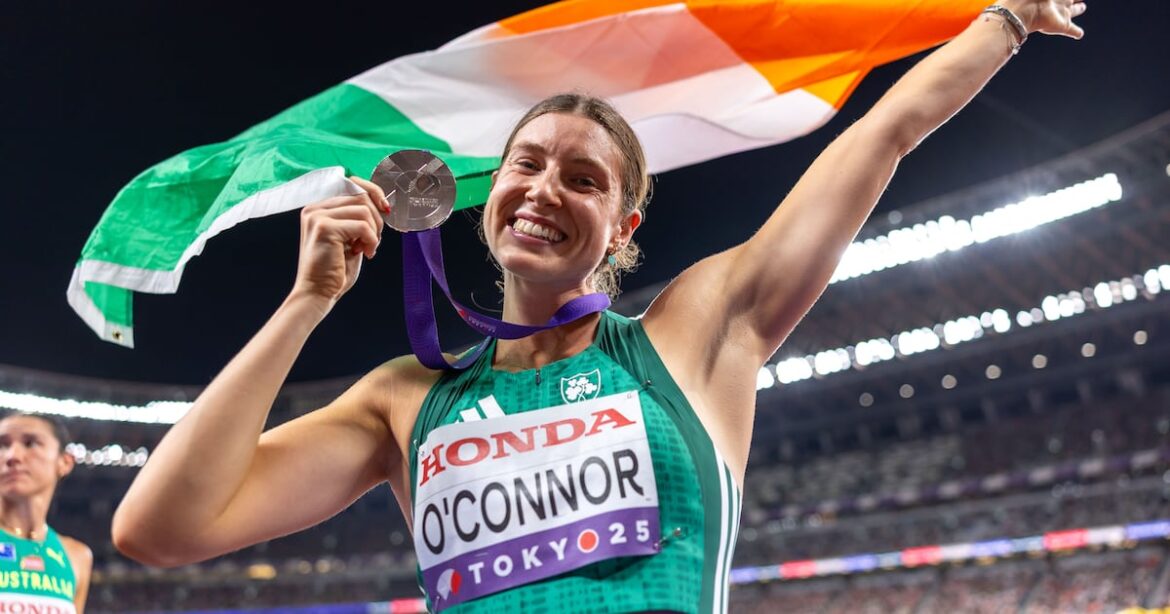World Athletics president Sebastian Coe didn’t need to show any hesitation when describing the performances that unfolded in Tokyo over nine days and nights as “extraordinary”, as most events on the track, field and the road certainly proved that.
“What we have seen is an indelible and compelling celebration of human sporting endeavour,” Coe said after last Sunday’s closing session of the 2025 World Athletics Championships. “This has been a championships for the ages.”
It was without question the most competitive World Championships in its history. World Athletics threw out some stats to back that up, starting with the fact 53 different countries won medals, including Ireland, seven more than the previous best.
There were also first-time medal winners for countries such as Samoa, Saint Lucia and Uruguay, and a first-ever World Championships gold for Tanzania.
There was one world record (take another bow, Mondo Duplantis), nine championship records, another nine continental records, 62 national records and 210 personal bests.
The overall competition score of 197,279, set by combining all 49 events, also surpassed the previous high of 196,796, set in Eugene, Oregon in 2022. Attendances were impressive too, a nine-day total of 619,288 inside the Japan National Stadium – with sell-out evening sessions across the programme.
These were also the best World Championships for Irish athletics, surpassing all pre-event predictions, even with the largest-ever Irish team of 28 athletes.
 Ireland’s Cian McPhillips celebrates winning the 800m semi-final and setting a new national record. Photograph: Morgan Treacy/Inpho
Ireland’s Cian McPhillips celebrates winning the 800m semi-final and setting a new national record. Photograph: Morgan Treacy/Inpho
Kate O’Connor’s silver medal in the heptathlon may have come against most expectations, including her own, and Cian McPhillips finishing fourth in the 800m certainly did, but with seven top-12 placings in all, plus three Irish records – O’Connor once, and McPhillips twice – we’ve never had more strength and depth.
Sarah Healy and Andrew Coscoran made the 1,500m finals, the first time Ireland had representatives in both blue riband showdowns at the World Championships. Nicola Tuthill finished 11th in the hammer final, the 21-year-old from Cork competing on this stage for the first time in her career, and 40-year-old Fionnuala McCormack also ran herself into a remarkable ninth-place finish in the marathon, her best placing on the global stage 18 years after competing in the 3,000m steeplechase at the 2007 World Championships in Osaka.
The mixed 4x400m ended up ranked 11th of the Tokyo entries, below their expectations and short of their Irish record, but there’s no reason to believe they can’t come closer next time. The quartet included Conor Kelly, just turned 18 and who this summer won the European Under-20 title, and Jack Raftery, the 24-year-old who ran sub-45 seconds for the first time this season.
[ Sonia O’Sullivan: Irish athletes head to Tokyo under the radar, but don’t write them offOpens in new window ]
Some of our close neighbours weren’t so happy. Great Britain came away from Tokyo without a gold medal for the first time since Paris 2003, winning only five medals in all – half of what they won last time – and without any medals in the five relays, traditionally one of their strongest events. Their relay teams won five of their 10 athletics medals at the Paris Olympics last summer.
From a team of 64 athletes, they finished 21st in the medal table. “Standards have risen, we do need to up our game,” said Jack Buckner, the chief executive of UK Athletics. “We’ve got to find a way of keeping pace with the resources we’ve got. There are no soft options.”
There were plenty of proper old-fashioned gold medal upsets in Tokyo, including Geordie Beamish winning the 3,000m steeplechase for New Zealand, beating defending champion Soufiane El Bakkali of Morocco. Isaac Nader won the 1,500m for Portugal after a crazy tactical race that defied all predictions, and Kenya’s Lilian Odira also upset the British duo of Keely Hodgkinson and Georgia Hunter Bell to win the women’s 800m.
 France’s Jimmy Gressier celebrates after winning the men’s 10,000m final in Tokyo. Photograph: Philip Fong/AFP via Getty Images
France’s Jimmy Gressier celebrates after winning the men’s 10,000m final in Tokyo. Photograph: Philip Fong/AFP via Getty Images
Jimmy Gressier winning the 10,000m for France was another shock, but not entirely without warning either. Italy’s Alberto Cova won this inaugural title in 1983, then the Olympic title a year later, the last man born outside of Africa to win any global 10,000m title, but Gressier produced a tactical masterclass, the last lap burn suiting him perfectly as he sprinted from fifth to first in the last 100m.
That perhaps was a hint that Tokyo might also have been one of the cleanest World Championships. It’s extremely rare these days (or else simply stupid) for any athlete to test positive during any major championships, although the Athletics Integrity Unit (AIU) sent out another warning on the eve of Tokyo when suspending Ethiopia’s Diribe Welteji after she refused to provide a sample for an out-of-competition doping control earlier this year.
The Welteji case will continue. It’s equally stupid for any athlete to refuse a doping sample, unless they had something to hide. Although even if Welteji is banned long-term, it’s unlikely she’ll have to surrender the silver medal won in the 1,500m in Budapest two years ago, where Ciara Mageean finished fourth.
Two of the nine championship records broken in Tokyo had stood since the first World Championships in 1983, both belonging to Jarmila Kratochvilova of the former Czechoslovakia. Some might say it was about time those records were broken.
Sydney McLaughlin-Levrone from the US took down the first record, winning the 400m in Tokyo in 47.78 seconds – now the second-fastest in history after the 47.60 clocked by Marita Koch of the former German Democratic Republic (GDR) in 1985.
After Odira won the women’s 800m in 1:54.62, bettering Kratochvilova’s 1:54.68, she completed an unprecedent Kenyan sweep of the six women’s middle and long-distance events in Tokyo, from the 800m up to the marathon, including the 3,000m steeplechase.
For most of the Irish athletes, the focus now turns to the European Championships in Birmingham next August, before the attention turns again to Beijing in 2027. Because as much as World Championships standards have been raised, so too have Irish athletics standards, and the challenge now is to maintain them – or, better still, surpass them – in two years’ time.


AloJapan.com